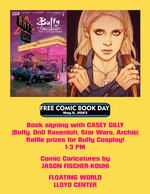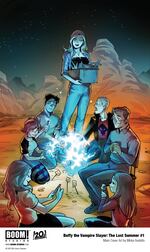
A poster advertising Free Comic Book Day at Floating World Comics.
Courtesy of Floating World Comics and BOOM! Studios
Saturday is Free Comic Book Day: a day where local comic book stores, publishers and readers around the world celebrate the medium with parties, costumes and of course, free comics.
Many comic book artists and authors call Portland home. That includes author Casey Gilly. Gilly has written stories set in the fantasy worlds of Dungeons and Dragons, Star Wars and Buffy: The Vampire Slayer. This week she launches her latest book, “Buffy The Vampire Slayer: The Lost Summer,” a standalone comic set in the same world as the cult classic TV show.
Gilly will be signing copies and celebrating all things Buffy at Floating World Comics for Free Comic Book Day. She spoke about her new book with OPB’s Donald Orr.
Listen in, or read a transcript of their conversation below.
Donald Orr: So for those unfamiliar with Buffy, could you give us a brief primer for the uninitiated?
Casey Gilly: Yes!
Orr: Who’s Buffy Summers, and what draws you to the character?
Gilly: To lure you in, Buffy is a teenage girl who is one of many teenage girls in a legacy of Slayers, which are chosen ones with superpowers who are on Earth to defeat the supernatural forces set out for evil. So Buffy does fight vampires but she also fights monsters and deals with cursed objects and dark magic. And around her helping are her friends — with all of their help, she deals with monster-of-the-week scenarios, and also larger-scale big bads that she ultimately defeats.
Orr: So the TV show first aired in 1997, and it’ll be 20 years this month since the show ended. Since then, there’s been loads of comics — like ones you’ve written — stories and conversations within the fandom. Why do you think these characters continue to endure and thrive decades after the show has ended?
Gilly: The Buffy fandom is really incredible. The elephant in the room is that there are some problematic creators associated with the show.
But something that I have seen as a Buffy fan since it aired — I’m in my forties, I was a teenager when it came out, I was watching it in syndication, and I felt the power even then — that there is a relatability to all of the characters in Buffy.
Yes, most of them are thin, white, conventionally attractive characters which can be difficult for people who don’t fit into that mold to really identify with. But within the writing are also characters that deeply struggle with anxiety and depression — and get to be villains and get to be heroes and get to be chaotic. And it really shows that there’s a scope of humanity in everyone. And depending on when you catch someone in their life, they could be their best self or their worst self, and their story still deserves to be heard.

"Buffy the Vampire Slayer: The Lost Summer #1" - Main Cover Art by Mirka Andolfo
Courtesy of BOOM! Studios
And I think that something that makes Buffy so relevant is it’s very easy to take this concept of a Slayer and use that to talk about whatever our current evils are. So, in the nineties, ‘97, the show really dealt with themes of feminism and equality and power structures against adults. And those were big things that we were talking about then.
It is so easy to take that same setup and apply it to whatever is going on today, which is part of why I love writing Buffy comics because I do have the autonomy to think like, ‘What is most relevant now, and what do we need to see a hero like this fight against?’
Orr: What themes do you want to explore in your book right now? How does it feel to continue where the show and other writers have left off, and to play around in that world?
Gilly: Well, The Lost Summer is a very fun book. It is not serious. It is Buffy and her friends going on vacation. There is very little fighting, there is very little staking. I really wanted to have this moment of levity.
So I will say that the thing that I wanted to showcase with this story is something that the show absolutely touched on, which is Buffy and Dawn’s relationship. But I really wanted to place that at the center of this. And to show that on top of all of the responsibilities Buffy has — the one that she takes the most seriously and I think also struggles the most with — is being in this parental role with her sister that she didn’t ask for. She didn’t know how to do it. And to me, that feels very authentic, that I think a lot of us are in roles where we want to plan this great trip, or have this vacation, or show our siblings or kids or people that we care—take the world in this really fun way. And then it’s just kind of average and fine, and that feels really relatable to me.
But the more serious book I write, “The Last Vampire Slayer,” is Buffy in her 50s and 60s. And that book, I really tackle themes that are very personal to me about ageism and about the expectations of women to continue to operate for the male gaze, and what it means in terms of their relevance and social capital when they no longer do that. So if you want something that’s a bit more serious and really confronts what I think are some of the bigger evils in the world, that’s definitely the book to check out.
Orr: That sounds awesome, I’m excited to read that series as well. You know, you mentioned exploring those themes that the TV show didn’t. What creative freedoms do you think are unique to comics that you couldn’t do on television?
Gilly: Well, comics as a medium allows for a lot of challenges to the reader. You know, in television, you can control the pacing, you can control the tone. And in comics, you don’t have that luxury. I can’t control how fast a page is turned. So you really have to think about, “How many stories am I telling on this page?”
And what I think is great about comics is that is, in a visual medium, very easy to control. Because the images can be telling one story, the words can be telling another. And I can create additional subtext to give the reader a lot to think through.

An excerpt from "Buffy The Vampire Slayer: The Lost Summer #1"
Courtesy of BOOM! Studios - Written by Casey Gilly. Art by Lauren Knight. Colors by Francesco Segala with color assists by Gloria Martinelli. Letters by Ed Dukeshire.
So even though I can’t necessarily control the pace at which they’re taking in this story, I can be really intentional about how it unfolds and how much information I’m giving them. So no matter how hard of a reader somebody is, there’s a great story to be told for somebody who’s just sort of casually flipping through and that reader who is gonna return multiple times to the same book. So I think that it gives that book some longevity and makes it something that’s really enjoyable for a reread.
Orr: So a lot of readers and fans will be at their local comic shop this weekend. What exactly is Free Comic Book Day? And what are you looking forward to the most?
Gilly: So Free Comic Book Day is I think one of the coolest events that happens every year. And if anybody listening isn’t sure what that is, it’s a day where local comic book shops and libraries order what they call free comic books from different publishers. And these books are free to the consumer, they’re not free to the shop.
So I just want to put out a PSA there that if you are participating in Free Comic Book Day, if you can’t buy anything that’s totally fine. But think about what you can do to give back to the shop or the library, like leave them a great Yelp review, or just be really cool to the people working there or tell your friends about it. And like do what you can to support the local community.
But do go in, grab comics — publishers put so much work into their Free Comic Book Day offerings. And just really be part of the community! I look forward to seeing people and especially kids. I love seeing kids come in and get comics and just having a great time and celebrating this art form. That’s so important to me.
